Your Baby Ferret: How To Take Care Of This Little Carpet Shark
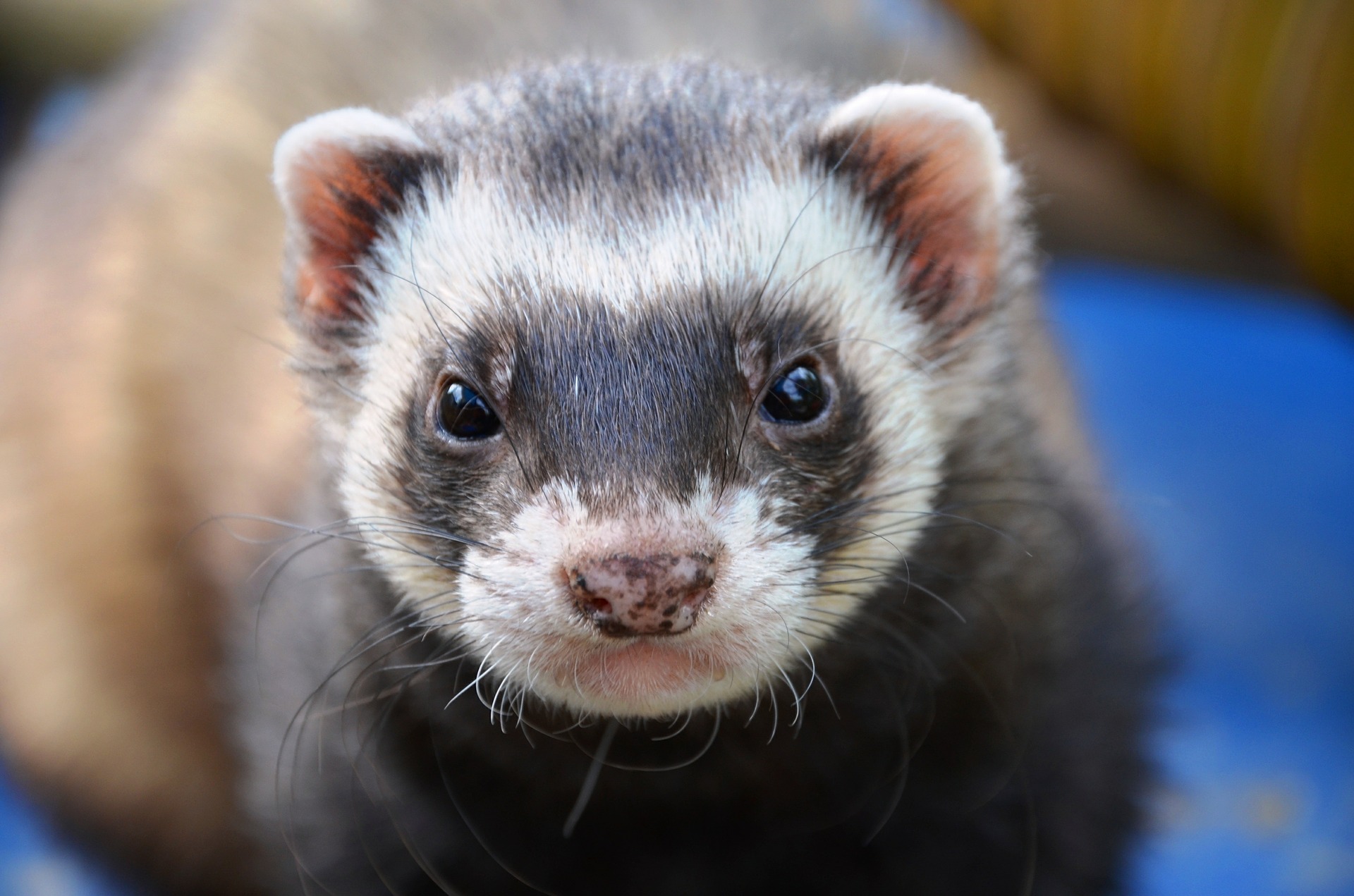
The first time I held a baby ferret, I didn't know what to expect. The only thing I had seen up to that point were grown ferrets wrestling behind glass at the local Petco. But when this guy's furry little stubby snout nuzzled my hand for pets and curled up in the hat I held in my hand for a nap, I fell in love.
Sure, it's easy to plunk down some cash and take this cute creature home, but then what? After all, a baby ferret isn't a puppy or a kitten. Caring for those animals is almost common knowledge. Taking care of a baby ferret -- not so much. I mean, what is a baby ferret anyway?
Fuzzballs, Carpet Sharks, And All The Names For Baby Ferrets
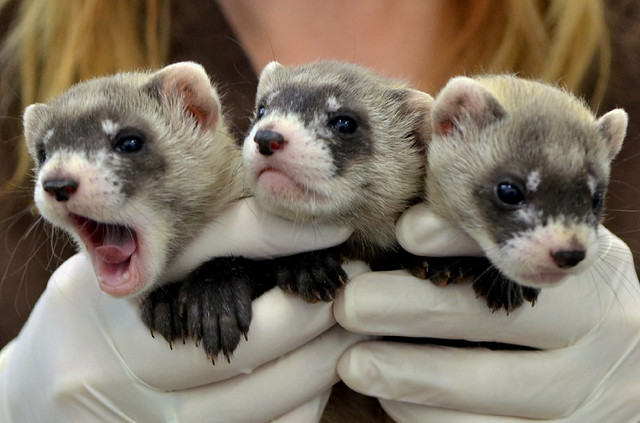
Image via flickr
You may have heard a baby ferret referred to under many names: fuzzballs, carpet sharks, and fuzzbutts, to name a few. But these names have more to do with their look and personality than anything else.
Baby ferrets do have actual names, though. After a gestation period of about 42 days, a mama ferret gives birth to a litter of kits. The baby ferret males in the litter are called hobs, and the females are called jills. Although, in North America, once a jill is spayed, she's called a sprite and once a hob is neutered, he's called a gib.
When they're born, these little balls of fluff weigh only about 6 to 14 grams and are 2 to 2 1/2 inches long. They're all born with white fur that starts developing into their individual colors at about three weeks.
Don't Believe What You Hear
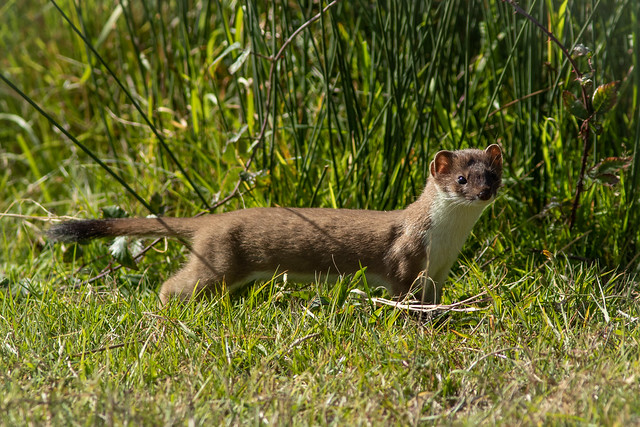
Image via flickr
Assumingly because they're small and low to the ground, people often mistake them for members of the rodent family, but they're not.
A baby ferret is from the Mustelidae family, (Mustela putorius, to be specific) and are related to polecats, weasels, wolverines, ermines, otters, and minks.
You may have heard that a baby ferret is smelly and violent. Not true. While it is true they have a light musky scent, that odor mainly comes from a scent gland which is removed when they're fixed.
As far as violent, they're just like any other domestic pet. When properly socialized and trained, a baby ferret is extremely loving and loyal.
Even Though These Creatures Have Been Domesticated For More Than 2,500
Even though these creatures have been domesticated for more than 2,500 years, they're illegal to own in some states and in some areas of the world.
There are laws in California, Hawaii, and D.C., preventing baby ferret pet ownership. Not only that, but other states have laws regulating importing, selling, neutering, and vaccinating ferrets.
So, if you want to own a baby ferret, first check your state laws for restrictions.
Line Up A Doc
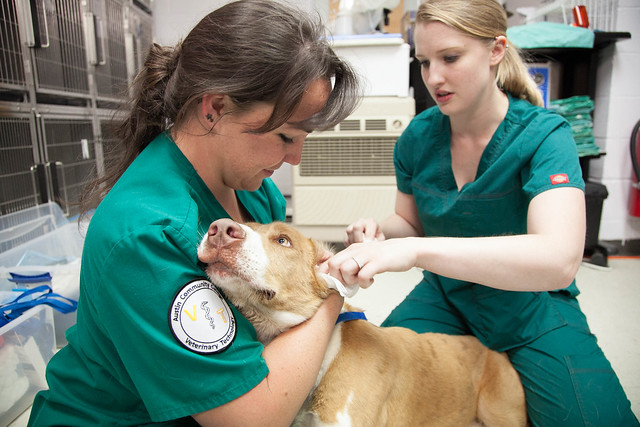
Image via flickr
Before considering adopting a baby ferret, you need to find a vet who specializes in ferrets. Not every vet knows how to care for them, and you don't want to find out after you bring your baby home that you have no ferret vet in your town.
If your baby ferret is lethargic, won't eat or drink, or their poo is runny or discolored, take them to the vet immediately. When ferrets get sick, things can go downhill quickly. So, it's best to have a doc on call.
How To Care For Your New Baby Ferret
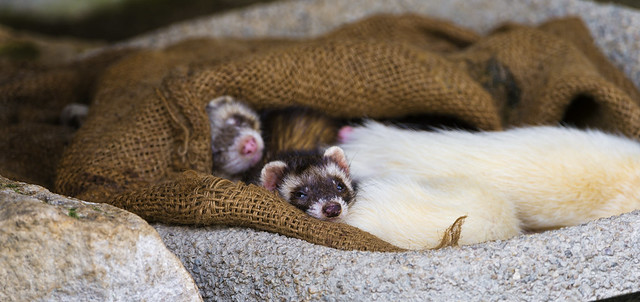
Image via flickr
A baby ferret isn't difficult to care for, but like any pet, they do have special needs you should know about. And part of understanding how to care for a baby ferret is understanding this curious little ball of energy.
Housing
Ferrets are nocturnal creatures by nature, but they'll adjust to your schedule. Your baby ferret will likely sleep between 15 and 18 hours a day. That means the other hours in the day, they'll want to play with you.
But while they're asleep, they need their own comfy space. Whether you choose to use a cage for your ferret is up to you, but if you decide to cage your baby ferret, you have to remember three very important things:
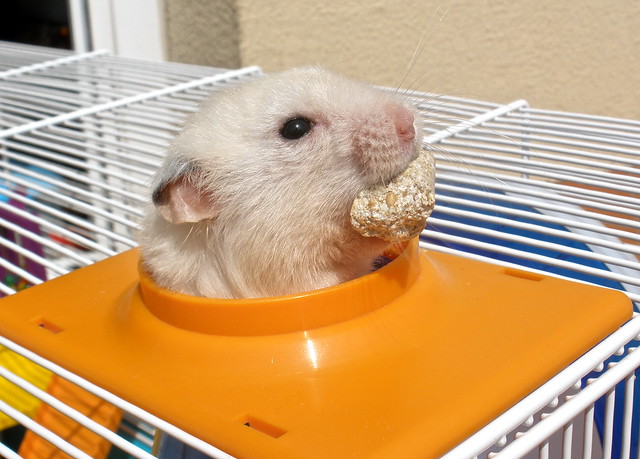
Image via flickr
They'll need bedding they can bury themselves in (fabric), a litter box, food, and clean water. It's also essential to fill the cage with ferret friendly toys, and a hammock.
All that said, it's essential to have your baby ferret out of his cage for a bare minimum of four hours a day. But the more time out of their cage, the better. They need time to bond with you, play, wander, bounce and explore.
Roaming Little Critters
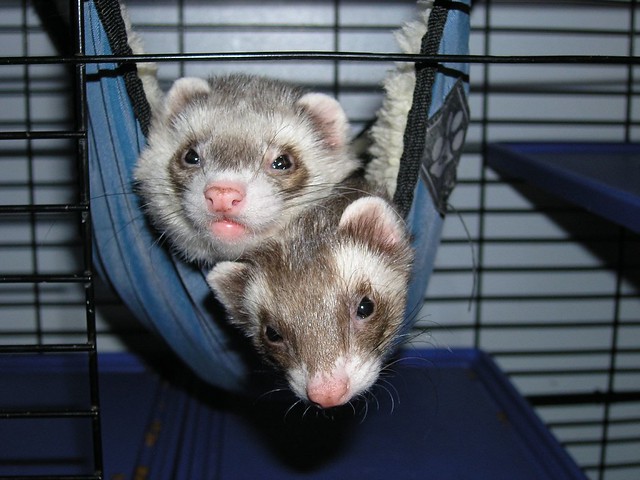
Image via flickr
You could decide that you don't want to cage your baby ferret, and that's fine, but let me warn you. If you don't have your house properly ferret-proofed, you will lose your baby.
And when we say ferret proof, we're talking baby-proofing on steroids. You start with the basics of baby proofing. Add in keeping all electric cords out of reach, plugging up all holes, and blocking anything that can be used to climb to great heights,
The truth is, while you may not want a cage, your baby ferret is going to need a safe place to rest. They also need a place to stay when you're not home. So, while you may not want them in a cage, they are going to need a safe place to call their own.
A word of warning: Ferrets are escape artists, and they want to be by your side when they're not sleeping. So, watch them with doors to make sure they don't get caught or escape. And watch any open windows because your baby ferret can push the screen out and leave your house.
Chow Time
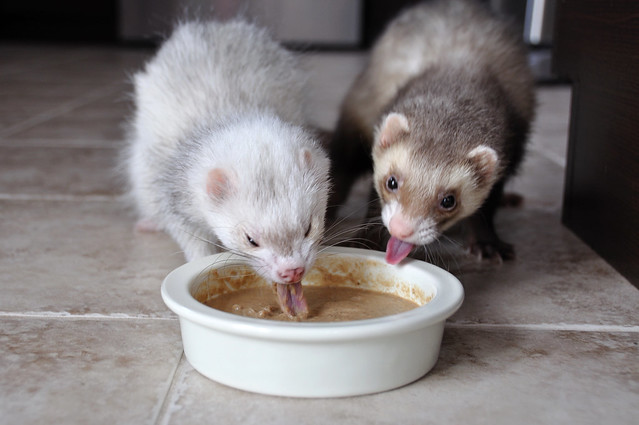
Image via flickr
Ferrets are strict carnivores. By the time you get your baby ferret, they will likely be weaned off of any baby food and onto pellets specifically designed for their bodies. Contrary to popular belief, you don't want to feed them cat or dog food -- they're ferrets. Feed them ferret food.
They should always have fresh food available to them, and Marshall Farms carries a well-formulated food that has all the nutrients they need. But, it doesn't come cheap. A 7-pound bag costs between $20 and $25. That's something to keep in mind when deciding to adopt.
In addition, there are also vitamins to give your baby ferret and treats they are sure to love.
Water Isn't Just For Drinking
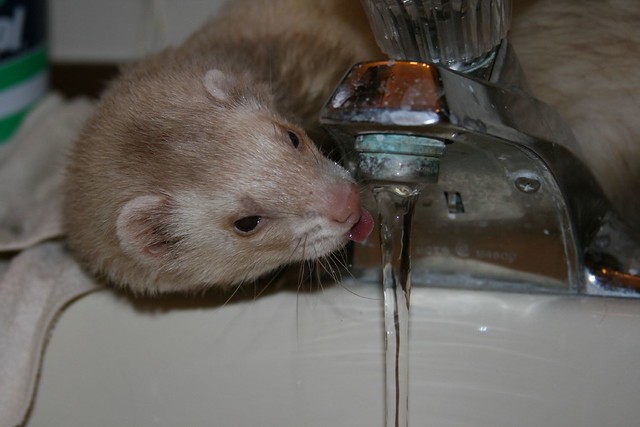
Image via flickr
Your baby ferret should always have fresh drinking water, and the best way to ensure they have a clean supply is through a hanging water bottle. It affixes to the side of their cage, or you can hang it on the wall for them. But your baby ferret has another love for water.
In addition to a fresh water supply, you should also give your baby ferret a little water in a dish to snorkel. Don't put it in your cage because you don't want your baby ferret to drown. But when your ferret is out, and you're there to supervise, make sure they have some water to play in.
They'll love digging in the water and putting their little noses in there, snorkeling, and blowing bubbles. Just make sure you keep a close eye.
Everybody Poops
By now you might be thinking this all sounds great, but where does your baby ferret go to the bathroom? First, you'll be happy to know they can be litterbox trained. If they don't take to the litter box when outside their cage, you can train them with puppy pads.
But there are a few things you should know — ferrets poop in corners. And there are special litter boxes that fit right in the corner for that purpose.
When training your baby ferret to go in the litter box or on the puppy pad, keep watch. You'll know when they're about to go to the bathroom because they'll turn their bodies around and start to back up in the corner. That's when you can redirect them and give them praise when they've done their business.
Never reprimand or punish them! They're smart creatures and respond to praise and positive reinforcement. Remember, they're babies and they're doing their best.
Warning about puppy pads: Don't leave them inside your ferret's cage. They will rip the pad to shreds and may eat the contents which will make them sick. Stick with a litter box filled with ferret designed litter pellets for your ferret.
Playing And All Things Dook
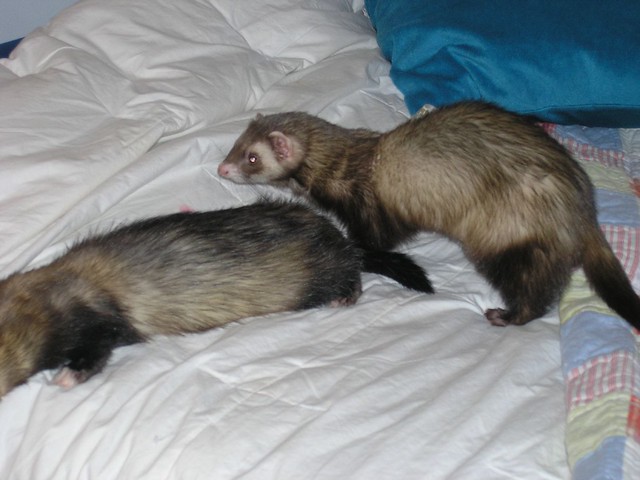
Image via flickr
One of a ferret's most favorite things, besides you, is playtime. They will want to play with you as much as they can. Be sure to have ferret or baby safe toys at the ready. Or just use your hands.
When your baby ferret gets excited, they will hop around like a bunny, roll like an alligator, and bite at your hands and arms. Plus, they'll let out an excited honking sound, called a dook. You'll often see them running into things as they're bouncing around and having a good old time.
Besides playing with your baby ferret, they'll also want to snuggle with you. They'll curl up in a little ball when they've exhausted all of their energy and go into a nice deep sleep on your lap or in your arms.
A note about sleep: Your baby ferret will go into a dead sleep at times. They'll be limp, they're tongue might hang out, and they don't respond. You might even think they're dead. Don't panic! It's normal, and it's the way they recharge. Listen for breath and a heartbeat to reassure yourself that your new friend is fine.
And About That Biting Thing
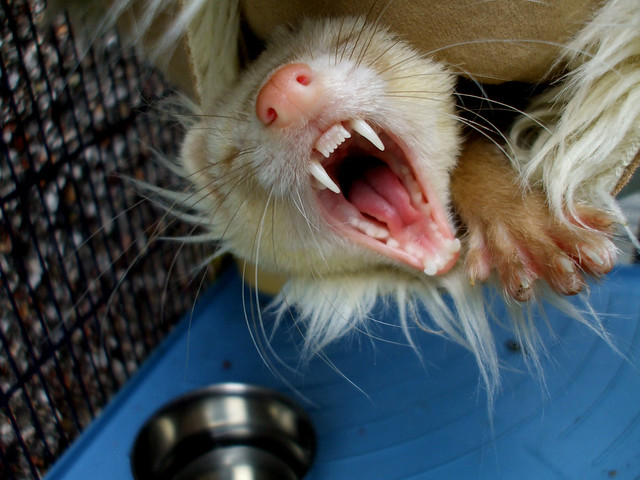
Image via flickr
When teaching your baby ferret how to play with you, they might chomp down too hard on your hands or arms (or legs). Ferrets have thick skin, so when they play with each other, they use a certain bite force. Until they know better, they might use that with you too.
Again, don't punish. Instead, use a ferret hiss sound and tell them you have people skin -- gentle. The ferret hiss is kind of like a cat hiss, but not. It's what their mother uses to correct them, and once you hear them do it -- out of displeasure -- you'll know the sound.
Rub A Dub Dub
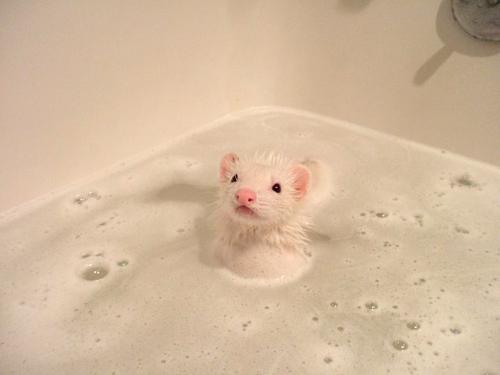
Image via flickr
As we said, your ferret will probably come de-scented, but they'll need baths. No more than once a month is plenty or else you'll dry out their skin. Use a ferret or baby shampoo, warm shallow water, and watch their eyes.
You'll also need to clip their nails and brush their teeth. Bath time is a good time to get these done too.
Fun With Your Faithful Furry Friend
A baby ferret is a fun addition to your house, as long as you're properly prepared. If you're willing to put in the time and effort a baby ferret takes over their 6 to 12-year lifespan, you'll get a loyal love back tenfold.
That said, ferret ownership isn't for everyone. It takes a special commitment and a patience as unique as your furry little friend.
Have you ever owned a ferret before? Have you ever seen a baby ferret? Tell us all your ferret stories in the comments!
